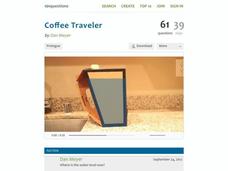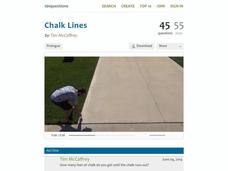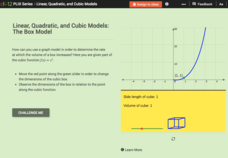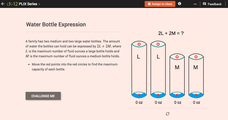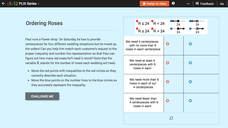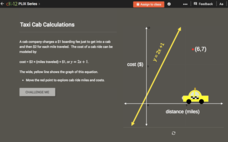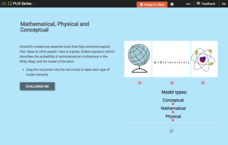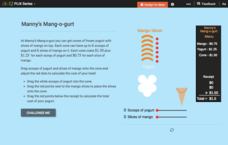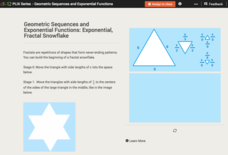101 Questions
Coffee Traveler
Investigate the volume of irregular figures in an inquiry-based exercise. Presented with an irregularly shaped box filled with water, learners must predict the level of water when it is tipped on its side. The class can divide the figure...
101 Questions
Bottomless Mug
How much coffee can you actually drink? An intriguing lesson has learners consider an advertisement for a bottomless mug of coffee. While considering the price of the mug, they analyze different scenarios to determine the cost-saving...
101 Questions
Chalk Lines
Read between the lines to find a solution. Budding mathematicians analyze a situation to solve a problem. They view a video presentation of the problem, brainstorm important information to gather, and write linear equations to find...
National Council of Teachers of Mathematics
Tidal Waves
Periodically ship the class a trigonometric application. Pupils model the level of water in a port. Using their models, learners determine the times that a ship can safely navigate into and out of the port, along with determining other...
Mathematics Assessment Project
Representing Functions of Everyday Situations
Functions help make the world make more sense. Individuals model real-world situations with functions. They match a variety of contexts to different function types to finish a helpful resource.
CK-12 Foundation
Linear, Quadratic, and Cubic Models: The Box Model
Models make math manageable. Individuals investigate a cubic function that models the volume of a cube through the interactive.
CK-12 Foundation
Logistic Functions: Fab Fitness
Strengthen your understanding of logistic functions. Young mathematicians change the carrying capacity of a logistic function and see how function values change. The function models the number of members in a gym over time.
CK-12 Foundation
Evaluate Expressions with One or More Variables: Water Bottle Expression
Fill your mind as you fill virtual water bottles. Pupils use an interactive to find the amount of water that can fit in given containers. Writing and evaluating an algebraic expression helps with this task.
CK-12 Foundation
Expressions for Real-Life Situations: Shopping for Sisters
Shopping for a resource on writing algebraic expressions? Look no further. Pupils use an interactive to drag shirts and pants out of a shopping bag. They create and evaluate an expression to represent the cost of the clothes.
CK-12 Foundation
Checking Solutions to Inequalities: Ordering Roses
It's important to have the correct number of flower arrangements at a wedding. Scholars match an inequality and a graph given a situation involving roses for wedding receptions. A set of challenge questions checks the matching pairs.
CK-12 Foundation
Checking Solutions to Equations: Taxi Cab Calculations
Ride to success in checking solutions to equations. Scholars use an interactive graph to identify points that are solutions to a linear equation. Interpreting these points in terms of the context completes the activity.
CK-12 Foundation
Visual Patterns: Balloons
Balloons aren't just for little kids; they can teach important math concepts, too. Individuals use an interactive to continue a color pattern with balloons. They continue the pattern and write a mathematical expression to represent the...
CK-12 Foundation
Two-Step Equations with Subtraction and Multiplication: Cupcake Equation
Solving equations is a piece of cake. Young mathematicians use an interactive to create a bar model to representing a situation involving cupcakes. They use the model to solve for the cost of a cupcake.
CK-12 Foundation
Two-Step Equations with Addition and Multiplication: T-Shirt Equation
Interactive bar models make solving equations fairly easy. Scholars use an interactive to adjust a bar model representing an equation. This model helps solve the equation.
CK-12 Foundation
Solving Real-World Problems Using Multi-Step Equations: Bowling Ball Delivery
How many bowling balls can a truck carry? A slider interactive changes the weight of boxes and the number of bowling balls per box. Investigating with this slider lets users find the maximum number of bowling balls.
CK-12 Foundation
Applications Using Linear Models: Scuba Diving
Dive into this resource on rates of change and linear models. Pupils use two sliders in an interactive to adjust water temperature and depth. They use a given linear equation to calculate the rate of change in water temperature per unit...
CK-12 Foundation
Modeling: Mathematical, Physical and Conceptual
Scientific models help explain ideas and concepts to non-experts. The online activity covers conceptual, mathematical, and physical models. Through four multiple-choice questions and three discussion questions, scholars gain a deeper...
CK-12 Foundation
Visual Patterns: Building the Queen's Tower
A resource fit for a queen. Scholars recognize and continue a pattern in towers people are building for a queen. They write and use an algebraic expression for the number of tiles in the towers.
CK-12 Foundation
Functions that Describe Situations: Manny's Mang-o-gurt
How much does it cost to add more mangos? An interactive allows users to see how the price of frozen yogurt changes based on the number of scoops and the number of slices of mango. Learners then answer a set of challenge questions about...
Education Development Center
Distance, Rate, and Time—Walking Home
Dig into a classic math problem with your classes. Through an engaging task, learners work with rate and distance information to make conclusions. In the task, two people walk at different rates; one leaves first, and scholars calculate...
CK-12 Foundation
Using Quadratic Equations to Solve Problems: Construct a Soccer Field
Build a soccer field through a little mathematical analysis. Individuals manipulate the dimensions of a soccer field as they drag points to new positions. The simulation shows the corresponding intercepts and area. As pupils explore the...
CK-12 Foundation
Solving Problems by Factoring: Building a Doghouse
Building a doghouse is easier with a little mathematical help! Young scholars use sliders to adjust the length of the doghouse and watch as it affects the width and area. They then answer questions that help them discover the question...
CK-12 Foundation
Direct Variation: Value of a Painting
Help your pupils find a pattern of direct variation. Young scholars use input-output pairs to find a constant of variation and then write the equation. As they build their equations, the interactive lesson provides feedback.
CK-12 Foundation
Exponential Growth: Exponential, Fractal Snowflakes
Examine an exponential growth model. Using a fractal, learners calculate the perimeters of each stage. When comparing the consecutive perimeters, a pattern emerges. They use the pattern to build an equation and make conclusions.


